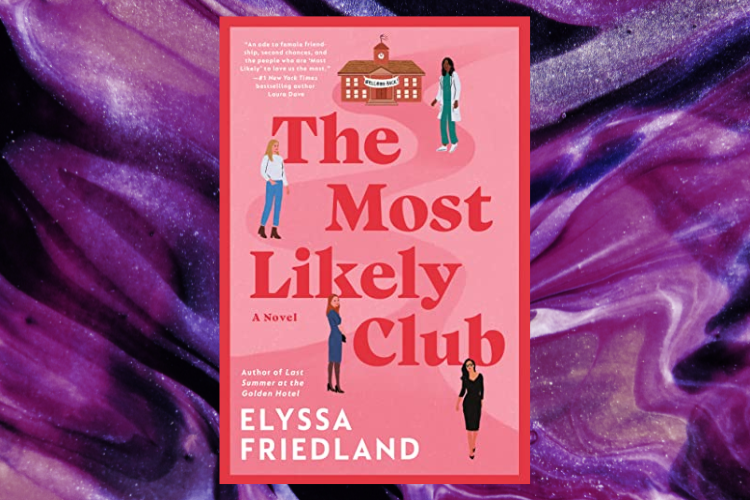
Elyssa Friedland on Female Friendships Over Time
Twenty-five years after their high school graduation, four women try to square the dreams they had with their present realities in The Most Likely Club (Berkely, $17.00); author Elysse Friedland talks to fiction editor Yona Zeldis McDonough about the power of female friendships.
YZM: This novel really focuses on the bonds between women and how our friendships empower and sustain us; can you elaborate on that?
EF: I had previously written several family dramedies and I always like to challenge myself as a writer. So I thought, why not tackle female friendship? It’s every bit as thorny as family, and can be every bit as valuable and sustaining in our lives. I personally live for my friends, a fact I always knew about myself but which I realized even more strongly during Covid when I couldn’t see them. This time in isolation caused me to reflect on what it is exactly about my female friends that I adore so much. What can they give me that my family cannot? The answer is a lot. All of that made it into The Most Likely Club.
YZM: Melissa Levin-Levine is the Jewish voice amid a quartet of others. What did you mean to suggest about diversity and bonds that transcend background and culture?
EF: I grew up in a very Jewish town and went to a Jewish day school and a Jewish summer camp. Then I got to Yale as an undergraduate and immediately looked for the other Jews to befriend. This wasn’t so easy and I ended up becoming very close with a group of women that were almost entirely not Jewish. This was a first for me and I can’t quite explain how valuable it was to gain a more diverse group of friends. I wish it had happened sooner. I don’t think it’s necessary to have the same religion or background to be incredibly close to someone. Values are what matters and perhaps also a shared sense of humor. It was important to me to show how close the four women in The Most Likely Club are despite being from different backgrounds. I love writing about Jewish characters and so it was a given that one of the four would be Jewish.
YZM: The novel also spotlights the effects—often pernicious, sometimes not—of peer pressure, and how it can both warp and fortify us—anything to add about that?
EF: I am living this now with my older two kids. They are in high school and middle school and what their friends think about them is about 100 times more important than what I think. And I know that’s totally natural and normal. It often terrifies me. I can imagine them trying substances before they are ready or breaking rules to appease their friends. But I remind myself of the positive effects too. My son’s high school is very rigorous. It’s cool to be smart there and I think he has positive pressure to keep up and get good grades. I also think peer pressure encourages them to try things they would normally fear – like attempting a scary ski mountain or scuba diving. Peer pressure is unavoidable. I wanted to write about it because I know it’s an issue that’s going absolutely nowhere and its effects can last a lifetime.
YZM: Let’s talk about the “gravitational forces of middle age” as you so aptly put it—how do they affect the characters? What can we do to resist or even defy them?
EF: Haha, I was talking about jowls and butt cheeks, but it really applies to so much more. A big theme of The Most Likely Club is how hard it is to change something in your life when you’re mired down by the minutia of daily chores. Middle-aged women are the sandwich generation. Many of us have aging parents to care for as well as demanding children to attend to. If we can make it to 9 pm without having a total breakdown, we consider the day a success. With working, caregiving, errands and endless paperwork filling our days, it is almost impossible to find the headspace to think about the bigger issues in life: are we fulfilled with our jobs? Is our partner making us happy? These heavier topics are tough to ponder after a grueling day.
YZM: What do you wish for these characters when we say good bye and leave them on the last page? Does each of them find her happy ending, or are happy endings only for fairy tales?
EF: That’s a great question and I think I would have given a different answer a week ago. I spoke just last week to a group of 150 women living in a retirement community. Their ages were roughly 65-80. During the Q&A, one woman asked me where I see myself when I’m their age. I’m currently 41. I had just spoken to the group about how much things change from high school to middle age, as reflected in my book, and now I was being asked to consider the next chapter. Before being asked the question that day, I would have said I’d like to be doing exactly what I’m doing now. Writing novels, teaching writing, and being close to my family. But after my spiel about how much things change, I realized that it’s impossible to predict what life has in store for us. Not only may life throw me a curveball, but what I want at 41 will probably be much different than what I want in thirty years. So I said simply, I honestly don’t know. I feel the same way about my characters in The Most Likely Club. They’ve made positive changes in their lives, but those changes only work for now. Ideally they reevaluate every ten years.



